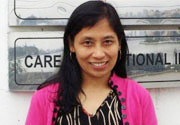| |
|
|

Interviews ::
 |
Amy Wu, an award-winning writer for the women’s Ag and Agtech movement |
 |
Ms. Irene Karani, Children’s Investment Fund Foundations’ Africa Climate Director |
 |
Natalia Schäfer (Schaefer), Leading and Globally Renowned Artist |
|
Read All Interviews |
News / Updates/ Analysis ::
COP 27- some hopes midst of chaos
Climate Change is Happening Now- Time to Take Action!
|


|
|
|

|
The NGO Climate Change Working Group (CCWG) has been established in
Vietnam in recognition of the fact that Vietnam is likely to be
significantly affected by climate change and that NGOs are well placed to
support localsed responses. CCWG provides a forum for Vietnamese NGOs and
INGOs and civil society to actively participate in the climate change
debate. CCWG consists of a core group which facilitates and coordinates
the working group. Current core members include, the VUFO-NGO Resource
center, Oxfam, CARE, CRS, SNV, EMW, WWF; the challenge to Change and SRD.
In addition to the core group, CCWG maintains various thematic groups.
|
Nguyen Thi Yen has been working as Climate Change Coordinator for CARE
International in Vietnam. She has got 10 years background on disaster
management. CARE is one of the core members of Climate Change Working
Group in Vietnam. On behalf of the network and CARE international in
Vietnam Yen, spoke to Earth Concern Asia Team about various aspects of
climate change issues in the context of Vietnam. Following is the brief
snapshot of her interview.
- What are the major climate change related issues in Vietnam?
According to the World Bank, Vietnam will be one of the five countries
worst affected by sea level rise and more intense and frequent extreme
weather. Even before the water rise, Vietnam is vulnerable to natural
disasters, particularly typhoons, floods, inundation, droughts, saltwater
intrusion. Temperature increase, less reliable rainfall, more intense and
frequent extreme weather and sea level rise are all likely to reduce the
productivity of rural livelihoods, lead to diminishing food security and
water shortages, and pose a significant threat to biodiversity, and human
security and health.
- How much is the climate change issue on government priority list?
Climate change has been on the agenda in the high level Consultative Group
meetings with donors since 2007 and there have been many other meetings
and workshops discussing impacts and priorities for action since then,
with a high level Mekong Delta Forum for CC established at end of 2009.
Therefore the government of Vietnam recognizes the vulnerabilities of the
country to CC and is looking to developed countries for financial support
to address these. Government have assigned responsibility for CC to MONRE
(Ministry of Environment and Natural Resources. MONRE’s focus to date has
been to study the science and impacts of CC. MONRE also hosts the DNA
which approves CDM projects, of which there are 78 now, though much more
could be done in climate change mitigation. In 2009 the government agreed
that a higher level office is required (prime minister level) to ensure
coordination between all sectors in recognition that climat change is a
multi-sectoral and cross cutting issue. MARD (Ministry of Agriculture and
Rural Development) are actively developing responses in disaster
preparedness and prevention, and REDD. According to the statement of the
Deputy prime minister and Ministry of Planning and Investment, Vietnam
still needs to study more about climate change impacts before actual
mainstreaming.
- Is there any National Guideline or Policy Strategy of Government to
address the causes and consequences of climate change?
Vietnam has developed and recently approved the National Target Programme
which is considered as the umbrella of climate change guidance in Vietnam
and lays out responsibilities across all sectors. MONRE has recently
issued the guidance framework to the local provinces focusing on
consideration to establish the climate change board at lower levels. MARD
has also developed their own action plan framework to guide their vertical
MARD network at lower levels. However, these documents focus on the need
to have more studies on climate change impacts and promote general coping
strategies rather than ways to address underlying causes of climate
change. NGOs are working with government to propose more use of
VCA(vulnerability and capacity assessment) at all levels to ensure
consequences and options for addressing these are informed and understood,
There is ongoing dialogue between government and donors on developing
low carbon technology to address causes in future.
- Who are the major funding agencies on Climate change in Vietnam? What
kind of support they are offering?
- UNDP: with MONRE and MPI on capacity builing, mitigation
- Embassy of Denmark: with MONRE on impact studies, capacity building in MONRE
- JICA: ODA base, mitigation, adaptation
- WB, ADB: Adaptation incl. Vietnam Coastal wetlands protection and development projects,CBDRM; mitigation (REDD)
- AusAid: Mekong River Commission Climate Change Adatation Initiative, impacts study in the Mekong, rice/crop research in the Mekong Delta
- Is there enough awareness on climate change issues in Vietnam among
general public?
There are several articles on internet, over television and radios on
climate change issues and potential impacts. However, these are not done
in a systematic manner and mainly accessible at the national level. At the
local levels in rural areas, there’s a very limited access to such kind of
information. There is limited awareness on what can be done to cope with
or reduce CC. However there is growing campaigns and interest among urban
populations and private businesses to reduce carbon footprints at all
levels.
- Is capacity building among the civil society and other sectors is one
of the major challenges?
A group of NGOs started a CC working group (NGO CCWG) in 2007 in response
to the need for greater information and capacity on CC and the interest
among NGOs to engage in and influence the national decision making
processes. The CCWG, currently chaired by CARE, conducted a capacity needs
assessment among the NGOS, INGOs, individuals, institutions, coordinated
development of a 3- year project on capacity building for the civil
society on climate change and assigned a VNGO to host it. Some of the
challenges include: (i) lack of expertise and trainers on adaptation (ii)
lack of adaptation and mainstreaming guidelines tailored for Vietnam
context (iii) access to relevant CC information which can be used
practically when developing CC action plans (iv) ability to access to
funding. With Government prominent issues are (i) facilitation capacity
among the Government officers as the top-down approach dominates (ii)
awareness in several cases (iii) Understanding of vulnerability assessment
and its importance.
- How do you see the issues of potential displacement of people due to
the climate change impacts in Vietnam?
According to MONRE projection, 1m sea level rise by 2100 could affect 12%
of land area and 10.8% of population, displace 22 million people.
Accordingly, I think that this is likely a big issue for the Vietnam.
Particularly the ongoing re-settlement from hydropower projects or new
re-settlement residence clusters from Government disaster prevention
activities attract a lot of concern as of the limitation of these
activities. During the UN climate change talks in Poznan in 2009 a paper
was launched on CC migration worldwide which cites the Mekong Delta as
particularly vulnerable to floods.
( See 3.5 the Mekong Delta: Living with floods and resettlement, in “In
Search of Shelter, Mapping the Effects of Climate Change on Human
Migration and Displacement”, May 2009,
http://www.careclimatechange.org/files/reports/CARE_In_Search_of_Shelter.pdf)
- How far migration and adaptation issues are taken care in broader
policy framework?
According to the recent MPI policy dialogue that CARE attends, MPI will
need to study more about climate change issues. As such, the climate
change adaptation is not going to integrate into the social economic plan
2011-2015 as well as the social economic strategy but likely to integrate
into annual plan in 2012. Migration has not been considered yet.
- It is said that Climate change might affect a major section of poor
men and women in Vietnam, how does NGO Working Group sees this issue?
This is the message NGO CCWG has been trying to disseminate to different
stakeholders. In the high level Mekong Delta Forum on Climate Change, CCWG
is delivering a presentation which opens with “Poor people in Vietnam
suffer most from the impact of climate change”. As such CCWG recommends to
adopt multiple benefit pro-poor CC adaptation actions which involve local
people in analysis and planning and support disaster risk reduction,
sustainable ecosystems and livelihood security. Similarly, CCWG members
have been working with MARD to influence on REDD strategy process in
Vietnam to ensure REDD mechanisms include benefit sharing, social and
environmental standards and does not displace or discriminate or in any
other way cause harm to poor and marginalized groups, particularly on the
interests, rights and livelihoods of forest dependent communities.
- How does NGO Working Group on Climate Change see the issue of
Community based planning from the very beginning of response?
NGO CCWG is strongly promoting community based adaptation in Vietnam as an
effective alternative to the top down approach more common in Government
sector. The crucial part for community based adaptation is the meaningful
participation of the community in the very beginning of the process
including assessment and design. Many NGOs have developed useful tools for
example, CARE’s Climate Vulnerability and Capacity Assessment (CVCA) tool,
and CCWG adaptation subgroup members are working together to design
guidelines and tools for use by all stakeholders when planning adaptation.
CCWG has also worked with MARD to organize 3 consultation workshops in 3
regions of Vietnam involving different local levels in 2008 before MARD
finalized their action plan framework. One key message that CCWG brings to
the coming Adaptation Forum for the Mekong Delta is that participatory
vulnerability and capacity analysis and planning are essential and should
build on indigenous knowledge and existing adaptive initiatives and
capacities.
Give your feedback: secretariat@earthconcernasia.com
Note: Opinions expressed in interview sections and individual write ups are of interviewee/ authors; earth concern facilitates to bring ideas and perspectives.
|
|

